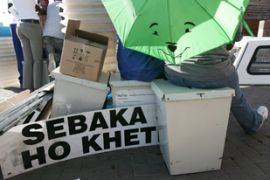High turnout in Lesotho vote
The country’s prime minister is facing a tough challenge from a former aide.

Thabane mingled with voters before casting his ballot.
“I’m confident that I will win elections because of the people,” he said. “They want change, everybody wants change and we are the symbol of change.
“I have always said we want a clean election and I am praying that this election will be clean.”
The early turnout on Saturday appeared higher than in the past. Previous elections have been marked by voter apathy, due to violence and tensions.
There were snaking queues at polling stations in Maseru. Some voters said they had lined up from 4am (0200 GMT), long before the booths opened at 7am.
Strong turn out
There are about 920,000 registered voters in Lesotho. Observers are expecting a strong turnout with interest heightened by the new challenge to the ruling Lesotho Congress of Democracy (LCD).
| “I feel happy that once again I have this chance to vote, I first voted in 1965. I want to vote because I need change, change that will bring development to our country” Mamorakabimo Moraka, 69, voter |
Mamorakabimo Moraka, 69, said it was time the old guard was replaced.
“I feel happy that once again I have this chance to vote. I first voted in 1965. I want to vote because I need change, change that will bring development to our country,” she told AFP.
The small mountainous country, surrounded by South Africa, was plunged into violence during the 1998 election over disputed results, when South Africa and Botswana had to step in militarily to quell tensions.
Thabane on Saturday said he would accept the outcome of the election even in “the unlikely event” of a defeat.
Thabane has been campaigning on a populist ticket, promising to work against poverty, hunger, corruption and disease.
Mosisili, meanwhile, has been pointing to economic indicators, such as inflation running at about five per cent and a predicted 3.5 per cent economic growth in the coming year, as reasons why he should get more time to tackle deep-rooted problems.
Much of Lesotho, landlocked by South Africa, still depends on subsistence agriculture, while those who have salaried jobs take home on average less than $1,000 a year.
HIV and Aids have also proved a major handicap to development with about 30 per cent of the population of nearly two million affected by the disease.
Thabane is seen to have the support of the young working class, while Mosisili can rely on backing from older voters and those in rural constituencies.
The election results are due from Sunday morning.